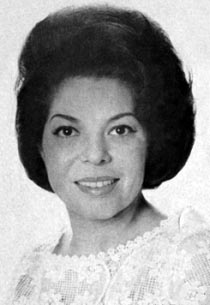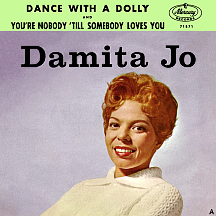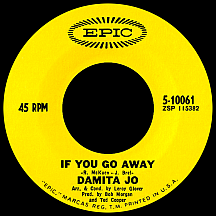DAMITA JO
If You Go Away
As a singer who became very comfortable in front of live audiences early in her career, Damita Jo was a success. As a recording artist with around one hundred single and album releases, she had to settle for only a handful that attained any notable sales levels. At the very least she deserves to be remembered for her longevity in the music business and natural vocal ability that grew more elegant and perceptive over time. Opportunities certainly came her way at the onset; born Damita Jo DeBlanc in Austin, Texas, she spent her teenage years in Santa Barbara, California. At age 18 she made the short hop southeast on the 101 to Los Angeles, where KOWL radio personality Joe Adams recognized Damita's talent and pulled a few strings to get her into some of the area nightclubs as a too-young-to-be-a-patron performer.
Adams also set her up with the previously independent Discovery Records, by that time one of Savoy's labels. Billboard magazine's reviewers, not typically prone to writing overly negative assessments, didn't mince words in reviewing her first single, "Believe Me," in July 1950, calling out her "high-pitched reedy voice," saying the record had an "absence of vitality." A few months later, the magazine reviewed her second Discovery 78, "Anytime, Anyplace, Anywhere" (which became a top seller for Joe Morris and Laurie Tate on Atlantic), saying, "Big band orking is far better than gal's chirping deserves." Ouch! Good thing she didn't let these criticisms affect her adversely or the body of work that followed might never have materialized.
She began performing with well-known L.A. group The 5 Red Caps, who were billed on RCA Victor as Steve Gibson and the Original Red Caps, while sidelining as a vocalist with Armando Solis and his orchestra on the Recorded in Hollywood label. She also waxed "High and Lonesome," a duet with RCA artist John Greer (who was coming off a big R&B hit, "Got You on My Mind"). Steve and his Red Caps had a moment in the fall of '52 with their cover of Patti Page's blockbuster ballad "I Went to Your Wedding" with Damita doing the lead vocal; it reached the top 30 on Airplay and Juke Box charts, becoming the first hit for everyone involved. She made more records with the band and did some solo work for RCA like the uptempo "I Don't Care," an early sign of the approach she would use on many future efforts. During this time, Steve and Damita became romantically involved and they were married in 1954; she gave birth to a daughter, Stephanie, the following year.
In 1956, Steve Gibson and the Red Caps moved to ABC-Paramount and finally had another hit with a cover of "Silhouettes," similar in sound to the much bigger original by The Rays. Damita Jo had one single on ABC, "How Will I Know?," a hand-clapper that walked a fine line between pop and rock. She and Steve were divorced in March 1958, though Damita remained a member of the Red Caps for two more years. In 1959 she signed with Mercury Records under the aegis of Shelby Singleton. First single "The Dance Was Over" made a coincidental parallel to things that were to come. Within a year she left Gibson's group for good and was replaced by Gloria Smth, who never quite gelled.
Damita finally had that elusive hit single as a solo artist in the fall of 1960 with "I'll Save the Last Dance For You," a by-the-numbers answer to the number one hit at the time, The Drifters' "Save the Last Dance For Me." Then she did a remake of the 1955 Jay McShann and Priscilla Bowman hit "Hands Off" (titled "Keep Your Hands Off of Him") that featured a poppin' Belford Hendricks arrangement so familiar in the big Brook Benton hits of the day. Next came another answer song, "I'll Be There," responding to the sentiment found in Ben E. King's fabulous solo single "Stand By Me." This one climbed as high as number 12 on the Billboard charts in August '61, just after former Drifter King's original had finished its run. So why didn't Mercury use Hendricks as an arranger on more of D. Jo's sessions? A pair of unoriginal answer discs arranged by lesser Mercury staffers, and beneath the talents of the singer, have gone down in history as her two biggest hits. She deserved better. But in the end, superior artistry emerges victorious, though it took another five years before the creation of the true pinnacle of Damita Jo's career.

In the meantime, Mercury came up with various gimmicks in attempts to sell the former "chirper's" music. In autumn '61 there was "Dance With a Dolly (With a Hole in Her Stocking)," a variation on "Buffalo Gals," the mid-19th century song that had recently been revived by The Olympics as "Dance By the Light of the Moon." The label teamed her with the country-oriented Merry Melody Singers and jazz vocalist Billy Eckstine with no luck, then hooked her up with Brook Benton in 1963 for a couple of duets; "Baby You've Got it Made" shamelessly emulated the style of Benton and Dinah Washington's pairing that had caused such a sensation three years earlier, while Brook and Damita's provocative "Stop Foolin'" was more original and accessible. Mercury dropped Damita from its roster later that year, then after a transitionary 1964 with only a few singles for smaller labels, she signed with Epic Records and worked with a number of producers and arrangers as an effort was made to position her as a headlining pop singer; material chosen played more to her sensitive capabilities.
Jacques Brel, the acclaimed singer-songwriter from Brussels, Belgium, composed "Ne Me Quitte Pas" ("Don't Leave Me") in 1959, a mournful yet brilliantly poetic romantic plea. Mid-'60s versions most familiar to American listeners include Nina Simone's recording in French and an interpretation in German by Marlene Dietrich. Around that time, Rod McKuen transformed the song into English as "If You Go Away," dialing down its grievous tone with a somewhat less desperate lyrical thrust. Damita Jo's impassioned reading of McKuen's words ('If you go away, on this summer day...then you might as well take the sun away...'), set to an exquisite arrangement by Leroy Glover, pensively alternated heartbreak and hope ('But if you stay, I'll make you a day, like no day has been, or will be again...') and hit all the right buttons; her four minute pop masterwork is arguably the best of all English language versions, and there were many that followed. It was the biggest hit, at least, reaching the top ten on the Easy Listening charts while spending ten weeks on the lower end of the Hot 100 in late 1966 and early '67. It's a song that, depending on your angle of observation, is one of the era's most remarkable recordings.
Other Epic singles were quite good including "Yellow Days" (originally a Spanish song, "La Mentira"). Damita recorded for the Ranwood label from 1968 to '71, turning out a mixed bag of cover versions and vintage classics. Her second marriage in 1961 to her manager, James "Biddy" Wood, culminated in the birth of son John in 1964 and another daughter, Jamel, in 1970; tragically, this youngest child died of sickle cell anemia in 1973. Afterwards she seldom recorded, instead performing in clubs and opening tours for stars like Count Basie, Ray Charles and comedian Redd Foxx. In the '80s and '90s she strictly performed gospel music. Damita Jo passed away on Christmas day in 1998, leaving an uneven but no less welcome recorded legacy.



